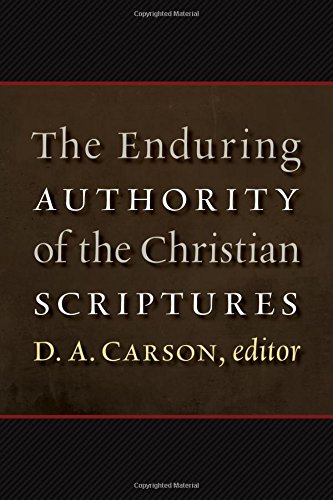A Brief Book Summary from Books At a Glance
Editor’s Note: Today we continue our series of “bonus” summaries covering all thirty-six chapters of the monumental volume, The Enduring Authority of the Christian Scriptures (D.A. Carson, ed.).
Chapter 22: Reflections on Jesus’ View of the Old Testament
by Craig L. Blomberg
(Summarized by Steve Runer)
Craig Blomberg contends that, while there have been numerous studies examining the use of the Old Testament in the New Testament…especially the Gospels…there is “almost nothing of any detail” addressing the historical Jesus’s perspective on the inspiration and/or the authority of the Old Testament. With this essay, Blomberg seeks to “fill that gap;” furthermore, he speaks to the significance of Jesus’s convictions for contemporary bibliological debates.
Bloomberg analyzes Jesus’s view of Hebrew Scripture using N. T. Wright’s “double similarity and dissimilarity” criterion, which seeks evidence that was plausible within a Jewish context during the first third of the first century, yet dissimilar enough that it was probably not invented. The data must also be plausible within the context of Jesus’s first followers, yet dissimilar enough from ancient Christianity that the “average” early Christian likely didn’t make it up. If elements of Jesus’s teaching in the Gospels satisfy all four benchmarks, then the teaching in question almost surely comes from Jesus.
Bloomberg organizes data collected from his “similarity-dissimilarity” analysis of Jesus’s use of Scripture into a structure of continuity and discontinuity…first with Judaism, then with early Christianity. In the area of continuity with the prevailing Jewish view, he presents extensive data (Jesus’s quotes from the Torah, his citing of timeless ethical principles, endorsement of specific legal prescriptions, use of prophesy, etc.) showing that Christ considered the Hebrew Scriptures authoritative. While he may have had interpretations that appeared novel, Jesus’s appeal to its “normative nature” certainly conformed to Jewish precedent. The author concludes that Jesus of Nazareth’s use of the Old Testament “stood in clear continuity with the Judaism of his day.”
Many of Jesus’s attitudes toward Scripture demonstrate discontinuity with the Judaism of his day, most notably in the Sermon on the Mount. Elsewhere, Jesus pronounces the forgiveness of sins apart from the offering of sacrifices, indicates that. . .
[To continue reading this summary, please see below....]The remainder of this article is premium content. Become a member to continue reading.
Already have an account? Sign In
